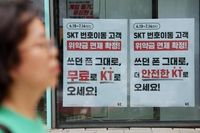South Korea’s telecommunications market has been thrown into turmoil over the past few months, with a high-profile hacking scandal at SK Telecom triggering a wave of subscriber defections and a dramatic reshuffling of market leadership. According to figures released by the Ministry of Science and ICT, SK Telecom’s subscriber share dropped to 39.00% in June 2025, slipping below the symbolic 40% mark for the second consecutive month. This comes in the wake of a massive hacking incident in April that rattled customer confidence and sent shockwaves through the industry.
As of early August, SK Telecom’s subscriber base stood at 22,356,700, down from its earlier dominance. The company has lost approximately 958,617 subscribers since the hacking incident became public knowledge in late April, a staggering figure that underscores the scale of the crisis. In response, SK Telecom waived early termination fees for affected customers, but this move only accelerated the exodus, with 60,1070 net subscribers leaving the company during this period, according to ajunews.com.
The immediate beneficiary of this upheaval has been LG Uplus, which has capitalized on the opportunity to attract disaffected SK Telecom customers. Industry sources cited by LiveBiz Today report that LG Uplus managed to capture an estimated 55% of the subscribers who switched away from SK Telecom in the aftermath of the hacking incident. This influx of new customers has translated into a significant boost in LG Uplus’s financial performance and market position.
In April 2025, LG Uplus overtook SK Telecom to become the nation’s leading carrier in terms of subscriber count. The company’s 2.4GHz network coverage was described as superior to that of SK Telecom, making it an attractive alternative for customers seeking both reliability and security. By the end of June, LG Uplus’s subscriber base had climbed to 11,181,347, accounting for 19.51% of the market—a 0.06% increase from the previous month. Meanwhile, KT, the other major player, reported 13,661,813 subscribers (23.84%), up 0.07% from May.
LG Uplus’s strong performance was not limited to subscriber growth. The company reported a 19.9% increase in second-quarter operating profit, reaching 304.5 billion KRW, and a year-over-year sales increase of 10% to 3.8444 trillion KRW. Net income surged by 31.9% to 2.171 trillion KRW, exceeding market expectations by 7.4%. The wireless business was the main driver, with operating profit rising 3.8% to 1.6542 trillion KRW and mobile service revenue up 4.3% to 1.5856 trillion KRW, according to LiveBiz Today.
What’s behind this impressive turnaround? LG Uplus executives point to a combination of efficient resource allocation, aggressive use of artificial intelligence to boost productivity and diversify products, and a focus on expanding their subscriber base. However, industry analysts are quick to note that the real catalyst was the spike in wireless subscribers following the SK Telecom hacking scandal. Unlike the usual costly campaigns involving heavy subsidies and marketing spend, LG Uplus was able to win new customers organically as subscribers voluntarily fled SK Telecom out of security concerns.
"Through structural cost competitiveness initiatives, we achieved a second consecutive quarter of profit turnaround," said Yeom Myung-hee, Chief Financial Officer of LG Uplus. She added, "Despite market uncertainties such as the abolition of the handset subsidy law, we will continue to strengthen our core service competitiveness and enhance long-term corporate value by expanding shareholder returns."
The numbers bear out the company’s claims. The combined total of LG Uplus’s mobile network operator (MNO) and mobile virtual network operator (MVNO) lines reached 29.917 million in the first half of 2025, up 9.9% from the previous year. The MVNO segment alone saw a 21.7% jump to 8.987 million subscribers, marking the sixth consecutive quarter of 20% or higher growth. The overall wireless market saw robust expansion as well, with MVNOs collectively growing their share to 17.64% in June, up from 17.47% in May, as reported by ajunews.com.
Meanwhile, SK Telecom has struggled to stem the tide. In the second quarter, the company reported consolidated revenue of 4.3388 trillion KRW, operating profit of 338.3 billion KRW, and net profit of 83.2 billion KRW. These figures represent declines of 1.89%, 37.07%, and a staggering 76.23% respectively compared to the same period last year. It’s a sharp contrast to the "earnings surprise" posted by LG Uplus and stands as a stark reminder of how quickly fortunes can change in the hyper-competitive telecom sector.
As for KT, the company has responded to the heightened security concerns by announcing plans to invest 1 trillion KRW in information security over the next five years. KT’s subscriber base has remained relatively stable, with modest growth in both MNO and MVNO segments.
Looking at the broader communications landscape, fixed-line services such as high-speed internet and internet phone lines have continued to show stable growth. The total number of high-speed internet lines reached 24,987,492, while internet phone and landline connections held steady at 11,218,718 and 10,006,107 respectively. Data usage trends also point to a rapidly evolving market: as of June 2025, 5G traffic soared to approximately 1.24 million TB, far outpacing 4G and 3G usage. The total volume of wireless data traffic hit 1,242,772 TB, highlighting the surge in demand for high-capacity services.
LG Uplus has not rested on its laurels. The company has continued to invest in smart home solutions, reporting a 2.7% year-over-year increase in internet revenue and steady IPTV business performance. Its enterprise infrastructure segment, which includes internet data centers (IDCs), saw a 5% boost in sales to 96.3 billion KRW, despite an overall 0.3% decline due to the transfer of its EV charging business to a subsidiary. Capital expenditures rose 3.5% to 5.401 trillion KRW, reflecting ongoing investments in network and service enhancements.
SK Telecom, for its part, has moved to shore up its brand and infrastructure. On August 6, the company signed a contract valued at 4.338 trillion KRW for 2.4GHz network construction, with 3.383 trillion KRW allocated for construction and 832 billion KRW for maintenance. These investments are seen as critical steps toward regaining customer trust and stabilizing its market share, which as of June, was still below 40%—a psychological blow for a company long considered the industry leader.
As the dust settles, the South Korean telecom sector finds itself at a crossroads. The hacking scandal has exposed vulnerabilities and forced all players to rethink their strategies. For LG Uplus, the crisis has become an unexpected windfall, propelling it to the top of the market and giving it new momentum heading into the second half of the year. For SK Telecom, the road to recovery will require not only technical fixes but also a renewed focus on customer trust and innovation. One thing is clear: in this fast-moving industry, no one’s position is ever truly secure.




